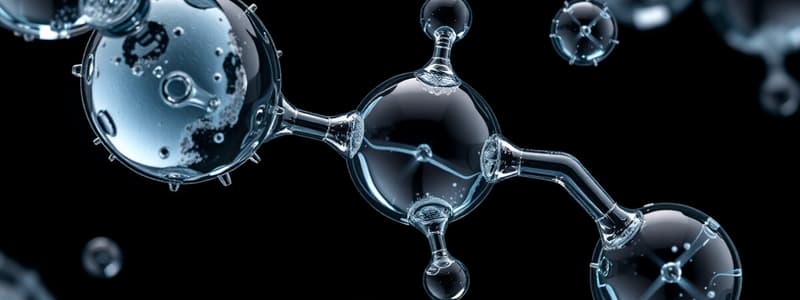Podcast
Questions and Answers
Which step of the scientific method involves making a structured prediction?
Which step of the scientific method involves making a structured prediction?
- Form a testable hypothesis (correct)
- Analyze data
- Make an observation
- Ask a question
In an experiment, what is the term for the factor that is deliberately changed?
In an experiment, what is the term for the factor that is deliberately changed?
- Independent variable (correct)
- Dependent variable
- Dependent variable
- Control condition
What does a correlation of 98.51% imply in experimental results?
What does a correlation of 98.51% imply in experimental results?
- There is no meaningful relationship.
- There is a strong relationship between variables. (correct)
- There is a perfect correlation.
- The relationship is guaranteed to be causal.
What is the purpose of the 'Methods' section in a scientific article?
What is the purpose of the 'Methods' section in a scientific article?
If two variables are correlated at 99.26%, what can you conclude?
If two variables are correlated at 99.26%, what can you conclude?
Which component of experimental design functions as a benchmark for comparison?
Which component of experimental design functions as a benchmark for comparison?
What does it mean if data does not prove an interpretation correct, but supports it?
What does it mean if data does not prove an interpretation correct, but supports it?
What is an essential factor to control in an experiment to ensure valid results?
What is an essential factor to control in an experiment to ensure valid results?
What does a correlation of 87.01% indicate about the relationship between two variables?
What does a correlation of 87.01% indicate about the relationship between two variables?
Why can hypotheses be proven incorrect but not definitively correct?
Why can hypotheses be proven incorrect but not definitively correct?
What is the correct definition of a compound?
What is the correct definition of a compound?
What are emergent properties of a compound?
What are emergent properties of a compound?
How many naturally occurring elements are there?
How many naturally occurring elements are there?
What defines a molecule?
What defines a molecule?
What is a significant reason why testing supports a hypothesis rather than proving it correct?
What is a significant reason why testing supports a hypothesis rather than proving it correct?
In scientific terminology, what does the term 'matter' encompass?
In scientific terminology, what does the term 'matter' encompass?
Which of the following statements best reflects the role of additional hypotheses in scientific inquiry?
Which of the following statements best reflects the role of additional hypotheses in scientific inquiry?
What can be said about sodium chloride (NaCl) when compared to sodium (Na) and chlorine (Cl)?
What can be said about sodium chloride (NaCl) when compared to sodium (Na) and chlorine (Cl)?
What distinguishes isotopes of the same element?
What distinguishes isotopes of the same element?
Which statement is true regarding the atomic nucleus?
Which statement is true regarding the atomic nucleus?
What is the atomic number of an element?
What is the atomic number of an element?
Which of the following best describes carbon-12?
Which of the following best describes carbon-12?
What is the approximate atomic mass of an element calculated from?
What is the approximate atomic mass of an element calculated from?
What charge do neutrons possess?
What charge do neutrons possess?
How do radioactive isotopes differ from stable isotopes?
How do radioactive isotopes differ from stable isotopes?
Which statement about electrons is true?
Which statement about electrons is true?
What is the mass number of an element?
What is the mass number of an element?
What determines the essential elements for different species?
What determines the essential elements for different species?
What determines the chemical behavior of an atom?
What determines the chemical behavior of an atom?
Which of the following elements would be classified as chemically inert?
Which of the following elements would be classified as chemically inert?
How is potential energy described for electrons?
How is potential energy described for electrons?
Which statement about valence electrons is true?
Which statement about valence electrons is true?
Which of the following elements has an incomplete valence shell?
Which of the following elements has an incomplete valence shell?
What is the primary subatomic particle that remains unchanged during the radioactive decay of Carbon-14?
What is the primary subatomic particle that remains unchanged during the radioactive decay of Carbon-14?
In radiometric dating, how is the age of a sample determined?
In radiometric dating, how is the age of a sample determined?
Which statement about radioactive tracers in medicine is correct?
Which statement about radioactive tracers in medicine is correct?
What is the half-life of Uranium-238?
What is the half-life of Uranium-238?
Which subatomic particle is primarily involved in chemical reactions?
Which subatomic particle is primarily involved in chemical reactions?
What is meant by the term 'half-life' in the context of radioactive decay?
What is meant by the term 'half-life' in the context of radioactive decay?
How does the potential energy of an object change when it is elevated, like a rock on a mountain?
How does the potential energy of an object change when it is elevated, like a rock on a mountain?
Which of the following isotopes has a significantly shorter half-life than Carbon-14?
Which of the following isotopes has a significantly shorter half-life than Carbon-14?
Which statement best describes the role of energy in matter?
Which statement best describes the role of energy in matter?
Which property distinguishes a radioactive isotope from a stable one?
Which property distinguishes a radioactive isotope from a stable one?
Flashcards are hidden until you start studying
Study Notes
Matter
- Matter is anything that takes up space and has mass.
- Elements are substances that cannot be broken down into simpler substances by chemical reactions.
- Molecules are two or more atoms held together by chemical bonds.
- Compounds are substances consisting of two or more elements in a fixed ratio.
Emergent properties of Compounds
- Sodium chloride (NaCl) is a compound with very different properties than its constituent elements, sodium (Na) and chlorine (Cl).
Essential Elements
- There are 92 natural elements.
- Essential elements are elements that an organism needs to live a healthy life and reproduce.
- Different species may require different essential elements.
- Plants have 17 essential elements.
- Humans have 25 essential elements.
Elements
- Each element consists of a specific type of atom, different from atoms of other elements.
- An atom is the smallest unit of matter that retains the properties of an element.
Subatomic Particles
- Atoms are composed of subatomic particles called protons, neutrons, and electrons.
- Protons have a positive charge, neutrons have no charge, and electrons have a negative charge.
Atomic Nucleus
- Neutrons and protons form the atomic nucleus.
- Electrons form a "cloud" of negative charge around this nucleus.
Atomic Mass
- The mass of protons and neutrons are nearly identical and measured in daltons or atomic mass units.
- Electron mass is very small and often ignored.
- An element’s atomic number is the number of protons in its nucleus.
- An element's mass number is the sum of the protons and neutrons in its nucleus.
Isotopes
- All atoms of an element have the same number of protons.
- Isotopes are atoms of the same element with different numbers of neutrons.
- Carbon-12 and Carbon-13 are examples of isotopes of Carbon.
- The number after the element in an isotope refers to its atomic mass.
Radioactive Isotopes
- Radioactive isotopes are unstable and tend to ‘decay’ or lose subatomic particles.
- When Carbon-14 decays, a neutron decays into a proton.
Radioactive Tracers
- Radioactive atoms can be taken up by the body and used similarly to non-radioactive isotopes of the same atom.
- Can be used as diagnostic tools in medicine.
Radioactive Dating
- “Parent” isotopes decay into “daughter” isotopes at a fixed rate, known as the half-life.
- Radiometric dating measures the ratio of different isotopes to calculate how many half-lives have passed since a fossil or rock was formed.
Electron Energy
- An electron’s state of potential energy is called its energy level, or electron shell.
- Electrons have different amounts of potential energy in different shells.
Valence Electrons
- Valence electrons are those in the outermost shell, or valence shell.
- The chemical behavior of an atom is determined by the valence electrons.
- Elements with a full valence shell are chemically inert.
- Elements with incomplete valence shells are chemically reactive.
Studying That Suits You
Use AI to generate personalized quizzes and flashcards to suit your learning preferences.




